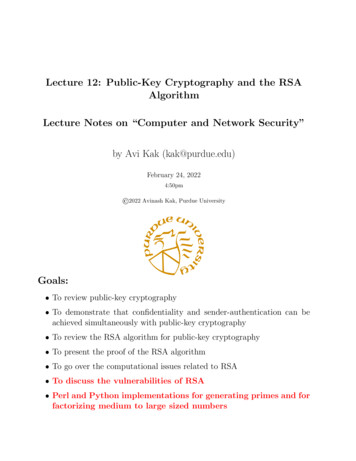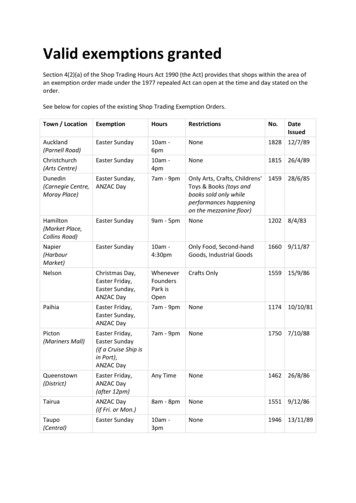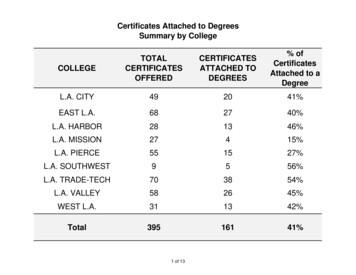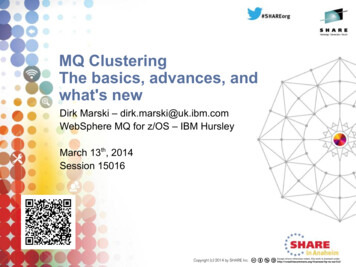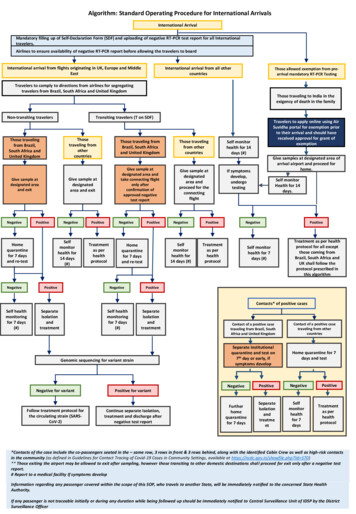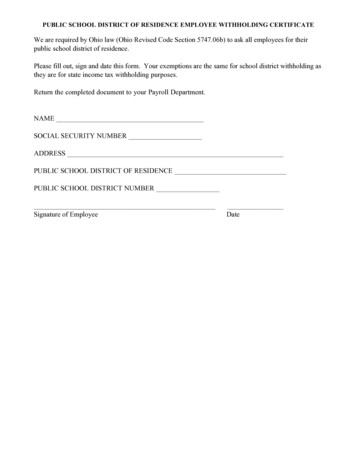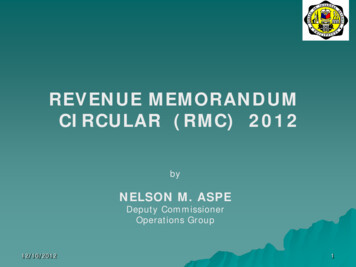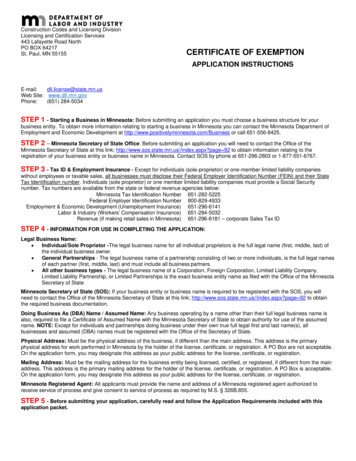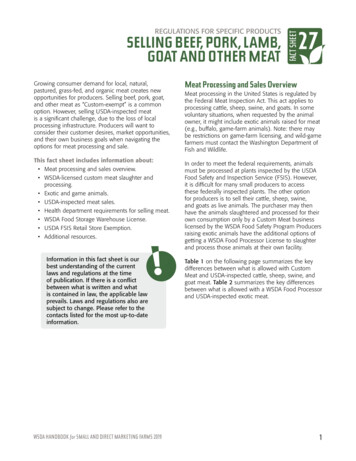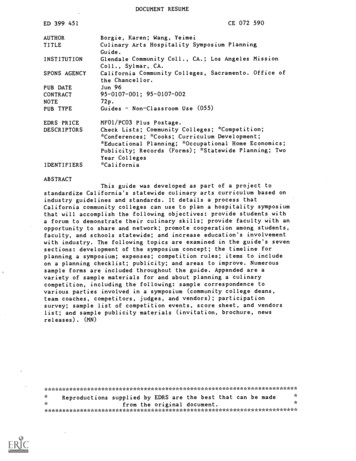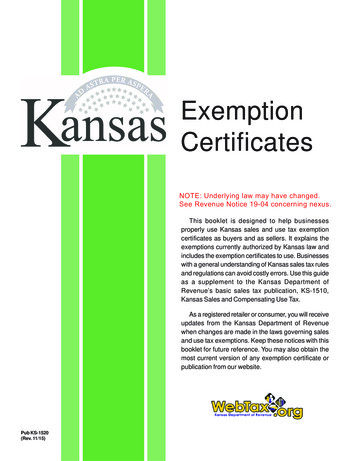
Transcription
ExemptionCertificatesNOTE: Underlying law may have changed.See Revenue Notice 19-04 concerning nexus.This booklet is designed to help businessesproperly use Kansas sales and use tax exemptioncertificates as buyers and as sellers. It explains theexemptions currently authorized by Kansas law andincludes the exemption certificates to use. Businesseswith a general understanding of Kansas sales tax rulesand regulations can avoid costly errors. Use this guideas a supplement to the Kansas Department ofRevenue’s basic sales tax publication, KS-1510,Kansas Sales and Compensating Use Tax.As a registered retailer or consumer, you will receiveupdates from the Kansas Department of Revenuewhen changes are made in the laws governing salesand use tax exemptions. Keep these notices with thisbooklet for future reference. You may also obtain themost current version of any exemption certificate orpublication from our website.Pub KS-1520(Rev. 11/15)1
TABLE OF CONTENTSRETAILER RESPONSIBILITIES.USING EXEMPTION CERTIFICATES . 133Completing the CertificatePenalties for MisuseThe Cardinal RuleWhat is an Exemption Certificate?Accepting Exemption CertificatesBlanket Exemption CertificatesRecord KeepingBUYING YOUR INVENTORY .SAMPLE EXEMPT ENTITY CERTIFICATE . 15EXEMPTION CERTIFICATES4Agricultural (ST-28F) .Aircraft (ST-28L) .Aviation Fuel Exemption (ST-28LA) .Consumed in Production (ST-28C) .Designated or Generic (ST-28) .Direct Mail Sourcing (ST-31) .Dry Cleaning & Laundry Retailer (ST-28X) .Ingredient or Component Part (ST-28D) .Integrated Production Machinery & Equipment (ST-201)Interstate Common Carrier (ST-28J) .Multi-Jurisdiction (ST-28M) .Project Exemption Request Exempt Entities (PR-76) .Project Exemption Request (PR-70b) .Project Completion Certification (PR-77) .Railroad (ST-28R) .Resale (ST-28A) .Retailer/Contractor (ST-28W) .Sales and/or Transient Guest Tax for Lodging (ST-28H)Streamlined Sales Tax (PR-78SSTA) .Tire Retailer (ST-28T) .U. S. Government (ST-28G) .Utility (ST-28B) .Vehicle Lease or Rental (ST-28VL) .Veterinarian (ST-28V) .Warehouse Machinery & Equipment (ST-203) .Resale Exemption Certificate RequirementsKansas Sales Tax Account NumbersItems Purchased Must Be For ResaleSample Completed Resale Exemption CertificateSALES TAX EXEMPTIONS .6Exempt BuyersItems Exempt from Sales TaxUses that are ExemptThe Utility ExemptionSPECIAL SITUATIONS .9ContractorsProject Exemption CertificatesManufacturers and ProcessorsWholesalersPaying Tax on Personal Use of InventoryWhen in Doubt RELATED TOPICS . 12Audit IssuesLocal Sales TaxOut-of-State SalesCompensating Use 74849If there is a conflict between the law and information found in this publication, the law remains the final authority. Under nocircumstances should the contents of this publication be used to set or sustain a technical legal position. A libraryof current policy information is also available on the Kansas Department of Revenue’s website at: ksrevenue.gov2
ACCEPTING EXEMPTION CERTIFICATESRETAILERRESPONSIBILITIESAn exemption certificate relieves a seller from collectingsales tax if it has obtained the required identifyinginformation as determined by the director and the reasonfor claiming the exemption at the time of purchase. A sellershould:THE CARDINAL RULE1) verify the identity of the person or entity presentingthe exemption certificate; and2) maintain the fully completed exemption certificate inyour sales tax records for at least three years.Kansas retailers are responsible for collecting the fullamount of sales tax due on each sale to the final user orconsumer. All Kansas retailers should follow this cardinalrule:All retail sales of goods and enumeratedtaxable services are considered taxableunless specifically exempt.You should obtain the appropriate exemption certificatefrom your customer at the time of the sale and no laterthan 90 days subsequent to the date of sale.Therefore, for every sale of merchandise or taxableservice in Kansas, the sales receipt, invoice, or bill MUSTeither:However, some customers claim to be exempt only afterthe goods or services have been delivered, and deduct thetax from the bill. When this happens, you are stillresponsible for obtaining an exemption certificate from thecustomer. If you are unable to secure an exemptioncertificate the sale is considered taxable, and as the retailer,you will be liable for the tax. show that the total amount of sales tax due wascollected, or be accompanied by a Kansas exemptioncertificate or Form PR-78SSTA (StreamlinedSales Tax Agreement Certificate of Exemption).BLANKET EXEMPTION CERTIFICATESWHAT IS AN EXEMPTION CERTIFICATE?If you make recurring exempt sales of the same type tothe same customer, you are not expected to obtain anexemption certificate for each transaction. Kansas lawprovides that a seller is relieved of liability for the tax whenhe obtains a blanket exemption certificate from a purchaserwith which the seller has a “recurring business relationship.”Such certificate need not be renewed or updated whenthere is a recurring business relationship between the buyerand seller. A “recurring business relationship” exists whena period of no more than 12 months elapses between sales.All of the certificates in this booklet may be used as blanketcertificates.An exemption certificate is a document that a buyerpresents to a retailer to claim exemption from Kansas salesor use tax. It shows why sales tax was not charged on aretail sale of goods or taxable services. The buyer completesand furnishes the exemption certificate, and the seller keepsthe certificate on file with other sales tax records.An exemption certificate must be completed in itsentirety, and should: explain why the sale is exempt, be dated, describe the property being purchased unlessusing Form PR-78SSTA, and contain the seller’s name and address and thebuyer’s name, address, and signature.All Tax-Exempt Entity Exemption Certificates (sampleshown on page 15) contain an expiration date. If aTax-Exempt Entity Exemption Certificate is obtained by theseller it can be used for all sales made prior to the expirationdate as provided on the certificate. There is no need forthe seller to obtain multiple copies of this Tax-Exempt EntityCertificate.Some exemption certificates also require a buyer tofurnish the Kansas tax account number or request adescription of the buyer’s business. The exemptioncertificates for nonprofit organizations require the exemptentity’s tax ID number.RECORD KEEPINGThe Kansas exemption certificates that begin on page15 meet these requirements. The requirement also appliesto Form PR-78SSTA. When the appropriate certificate isused, and all the blanks are accurately filled out, thecertificate may be accepted by a retailer.You must keep all sales tax records, including exemptioncertificates, for your current year of business and at leastthree prior years. DO NOT send exemption certificates tothe Kansas Department of Revenue with your sales taxreturn.3
NOTE: A completed exemption certificate must be obtained from thecustomer before the sale is exempt.BUYINGYOUR INVENTORYRetailers from other statesAs a general rule, wholesalers and buyers from otherstates not registered in Kansas should use the MultiJurisdiction Exemption Certificate (ST-28M) or a PR-78SSTAto buy items for their resale inventory. These certificatesmay also be used by wholesalers to buy their inventory. Ifthe inventory item purchased by an out-of-state retailer isdrop shipped to a Kansas location, the out-of-state retailermay provide to the third party vendor a Resale ExemptionCertificate from any state, or the Multi-JurisdictionExemption Certificate showing registration for any state.They may also use PR-78SSTA exemption certificate. Thelaw does not require that they have a Kansas registration inorder for the sale to be exempt.Probably the most widely used sales tax exemption isfor the purchase of items intended for resale. When buyingyour inventory from a wholesaler or another retailer, orselling inventory items to another retailer, you will use aResale Exemption Certificate (ST-28A) or Form PR-78SSTA.RESALE EXEMPTION CERTIFICATE REQUIREMENTSA resale exemption certificate has two requirements:1) the items purchased must be for resale in the usualcourse of the buyer’s business; and 2) the buyer musthave a Kansas sales tax account number, except indrop shipment situations.Sales Tax Account Number FormatYour Kansas sales tax account number has three distinctparts:A retailer should make sure both requirements areprovided before accepting a Resale Exemption Certificatefrom the customer. The following discussion of theserequirements will help you avoid costly errors.004-481880059F-01ITEMS PURCHASED MUST BE FOR RESALETax Type. Each tax type administered by the KansasDepartment of Revenue has been assigned a number.The “004” is the number assigned to Retailers’ Sales Tax.The tax type number appears on your registration certificateand on the sales tax return.A buyer can use a resale exemption certificate only topurchase the property that will be for resale and not forpersonal or other nonexempt use. The property beingpurchased must be of the type normally sold at retail in theusual course of the buyer’s business. For example, arestaurant owner cannot use an exemption certificate tobuy tires or appliances since a restaurant does notcustomarily sell these items.Account Number EIN (Employer IdentificationNumber). The account number is your federal EIN,followed by the letter “F.” The nine-digit EIN is issued bythe Internal Revenue Service to identify employers andbusinesses.If you are not required to have an EIN, the KansasDepartment of Revenue will create an account number foryou. These account numbers begin with a “K” (or an “A” ifregistering online with the Kansas Business Center) followedby eight numbers and the “F.” For example:KANSAS SALES TAX ACCOUNT NUMBERSThe Kansas Department of Revenue assigns a salestax account number to you after you complete a BusinessTax Application (CR-16). The account number is printedon your Retailers’ Sales Tax Registration Certificate and isused to report and pay the sales tax you collect from yourcustomers to the Kansas Department of Revenue. It is alsothe number that MUST be provided on a Resale ExemptionCertificate (ST-28A) or Form PR-78SSTA.004-K12345678F-01Numerical Suffix. The two-digit code at the end ofthe number is for the Kansas Department of Revenue’suse. For most taxpayers it is “01.” This code could eitherdenote the number of locations or number of registrationsunder this EIN, “K”, or “A” number.CAUTION: DO NOT accept a photocopy of acustomer’s sales tax registration certificate insteadof a completed exemption certificate. You cannotexempt a sale from tax simply because the buyer is aregistered retailer.SAMPLE COMPLETED RESALE EXEMPTIONCERTIFICATEA common misconception is that a sales tax accountnumber is also a “tax-exempt” number. However, a sale isnot exempt simply because the buyer has a sales taxnumber. A tax number only proves the customer is aregistered retailer; it does not certify that the item(s)purchased are exempt (for resale or any other reason).All the blanks on an exemption certificate should becompleted before the exemption certificate may beaccepted by a retailer (page 14). Use the Resale ExemptionCertificate illustrated in the following example as a guide.Also, the Form PR-78SSTA may be used.4
James Adams owns a convenience store in Topeka, and buys his inventory from Wholesale Candies and Snacks.His sales tax account number is 004-740000000F-01. The Resale Exemption Certificate he completed for his vendoris below. He also purchased display racks from this vendor, but since he is the final consumer of the racks, theywere invoiced separately and he paid the sales tax on them.KANSAS DEPARTMENT OF REVENUERESALE EXEMPTION CERTIFICATEThe undersigned purchaser certifies that the tangible personal property or service purchased from:Seller:Wholesale CandiesBusiness NameAddress:123 Main StreetTopekaKS66612Street, RR, or P. O. BoxCityStateZipwill be resold by me in the form of tangible personal property or repair service. I hereby certify that I hold valid Kansas sales004-740000000F-01food, gasoline, and beveragestax registration number, and I am in the business of selling(May attach a copy of registration certificate)(Description of product(s) sold; food clothing, furniture, etc.)candy, gum, packaged snacksDescription of tangible personal property or services purchased:I understand and agree that if the items purchased with this certificate are used for any purpose other than retention, demonstration,or display while being held for sale in the regular course of business, I am required to report and pay the sales tax, based upon thepurchase price of the items.James Adams Convenience StorePurchaser:Name of Kansas Retailer2171 Southwest BlvdTopeka,KS66611Address:Street, RR, or P. O. BoxCityJames AdamsSignature:StateZip4/28/11Date:THIS CERTIFICATE MUST BE COMPLETED IN ITS ENTIRETY.WHO MAY USE THIS CERTIFICATE? Only those businesses and organizations that are registered to collect Kansas sales tax andprovide their Kansas sales tax registration number on this form may use it to purchase inventory without tax. For additional informationsee Publication KS-1520, Kansas Exemption Certificates.Nonprofit groups or organizations exempt by law from collecting tax on their retail sales of tangible personal property (such as aPTA or a nonprofit youth development organization) should use the exemption certificate issued to it by the Department of Revenuewhen buying items for resale.Wholesalers and buyers from other states not registered in Kansas should use the Multi-Jurisdiction Exemption Certificate,Form ST-28M, to purchase their inventory. HOWEVER, if the inventory item purchased by an out-of-state retailer who has sales taxnexus with Kansas is drop shipped to a Kansas location, the out-of-state retailer must provide to the third party vendor a Kansassales tax registration number, either on this certificate or the Multi-Jurisdiction Exemption Certificate, for the sale to be exempt. If the outof-state retailer DOES NOT have sales tax nexus with Kansas, it may provide the third party vendor a resale exemption certificateevidencing qualification for a resale exemption, regardless of the state in which the retailer is registered for sales tax.Contractors, subcontractors, or repairmen may not use this certificate to purchase their materials, parts, or tools. Retailer/Contractors should use a Retailer/Contractor Exemption Certificate, Form ST-28W, to purchase their resale inventory.WHAT PURCHASES ARE EXEMPT? Only goods or merchandise intended for resale (inventory) are exempt. Tools, equipment,fixtures, supplies, and other items purchased for business or personal use are TAXABLE since the buyer is the final consumer of theproperty.The items purchased with this certificate must correspond to the type of business buying them. For example, a retail clothing storemay only reasonably purchase items of wearing apparel and accessories with this certificate. All other kinds of items are not usually soldby a clothing store to their customers and, therefore, cannot be purchased with this certificate.LABOR SERVICES. This certificate applies ONLY to items of tangible personal property. A contractor may not use an exemptioncertificate to purchase the labor services of another contractor or subcontractor. Taxable labor services performed by a contractorcan ONLY be purchased without tax with a Project Exemption Certificate issued by the department or its authorized agent.RETAINING THIS CERTIFICATE: Sellers should retain a completed copy of this certificate in their records for at least three yearsfrom the date of sale. A seller is relieved of liability for the tax if it obtains a completed exemption certificate from a purchaser with whichthe seller has a recurring business relationship. A certificate need not be renewed or updated when there is a recurring businessrelationship between the buyer and seller. A recurring business relationship exists when a period of no more than 12 months elapsesbetween sales transactions.5
There are special rules applicable to exempt entities onpurchases for certain construction projects and repair work.See Project Exemption Certificates (found herein).SALES TAX EXEMPTIONSException: When the state of Kansas or nonprofithospital operates a taxable business (such as a publiccafeteria or gift shop), or when a political subdivisionsells or furnishes utilities, “non-inventory items”purchased for use in these taxable businesses aretaxable to the otherwise exempt group.The sales tax exemptions authorized by Kansas law fallinto three general categories. These are: entities who areexempt, specific items that are exempt, and uses of anitem that makes it exempt. This section explains eachcategory with examples and exceptions noted. Additionalinformation about an exemption is part of the certificatedesigned for it.A city’s gas utility must pay sales tax on officeequipment, pipe and vehicles used (evenpartially) by it’s gas utility. A hospital mustpay sales tax on its restaurant equipment,furniture, fixtures and reusable utensils purchased for itspublic cafeteria.EXEMPT ENTITIESAll of the following entities are exempt from sales taxwhen making a direct purchase of goods. Most, but not allof these entities, are also exempt when making a directpurchase of a taxable service. The Tax-Exempt EntityExemption Certificate issued by the Kansas Departmentof Revenue to the entity states whether its exemption islimited to just goods or whether the exemption extends toservices as well. A direct purchase is one that is billeddirectly to the exempt buyer. A retailer can require paymentby check, voucher or warrant of the exempt entity, but it isnot mandatory to do so.Credit CardsMany government agencies are issuing credit cards toemployees and agents who travel or make purchases whileon official business or on behalf of the agency. When theagency is responsible for payment of credit card charges,purchases made by employees with said credit card areexempt from Kansas sales or use tax as a direct purchase.When someone other than the exempt entity is responsiblefor payment of the credit card charge, the purchase is notautomatically exempt. The appropriate exemption certificatemust be obtained. The U.S. Government, its agencies andinstrumentalities The state of Kansas and Kansas political subdivisions: school districts, counties, cities, etc. Elementary and secondary schools Noncommercial educational television and radiostations Nonprofit blood, tissue and organ banks Nonprofit educational institutions Nonprofit 501(c)(3) historical societies Nonprofit hospitals Nonprofit 501(c)(3) museums Nonprofit 501(c)(3) primary care clinics Nonprofit 501(c)(3) religious organizations Nonprofit 501(c)(3) zoos Nonprofit youth development programs Parent-teacher organizations (PTA or PTO)Exception: The rental of hotel rooms by agents oremployees of the U.S. Government while on officialbusiness is exempt regardless of the method of payment.Buyers who are NOT exemptA common misconception is that all nonprofitorganizations are exempt from retailers’ sales tax. While anonprofit status for income tax purposes may be arequirement for a Kansas sales tax exemption, nonprofitorganizations that have not been granted a specific salestax exemption must pay tax on their purchases. Groupsand organizations that are NOT EXEMPT from payingKansas sales tax include alumni associations, charitableand benevolent organizations, clubs, labor unions, andprofessional associations.FOR A COMPLETE LIST OF EXEMPT ENTITIES SEE PAGE 16.CERTIFICATES FOR TAX-EXEMPT ENTITIESThe 501(c)(3) designation refers to the section of theInternal Revenue Code under which a nonprofit entity hasbeen granted an exemption from federal (and state) incometax. Although used to define who qualifies for an exemption,a nonprofit 501(c)(3) designation does not mean theorganization is automatically exempt from sales tax. Onlythe entities listed under Kansas sales tax statutes are exemptfrom paying Kansas sales tax on their direct purchaseswhen the appropriate exemption certificate is completedand provided to the retailer.Kansas law requires that all sales tax-exempt entitiesobtain and utilize only exemption certificates issued by heKansas Department of Revenue or the SSTA exemptioncertificate (PR-78SSTA). These certificates, an exampleof which is on page 15, contain the exempt entity’s NAME,ADDRESS, and TAX EXEMPTION NUMBER issued bythe Kansas Department of Revenue. Any sales tax-exemptentity that does not have an exemption certificate may applyonline at the Kansas Department of Revenue’s website.Although exempt by law, these entities must still supporttheir exemption with a completed exemption certificate. Thisbooklet contains exemption certificates that can be usedfor each of these exempt buyers with examples andcommon pitfalls to avoid or, Form PR-78SSTA can be used.The purpose of the tax-exempt exemption certificates isto control fraudulent tax-exempt purchases and to assistretailers, sales people and cashiers in identifying exemptentities and easily determining whether a claim forexemption is valid, based on the exempt entity’s status.6
Unless the seller already has it on file, if one of the entitieslisted on page 16 requests an exemption and they do notpresent the Kansas Department of Revenue-issuedcertificate or Form PR-78SSTA (providing the purchaser’sTax-Exempt Identification Number), the seller must denythe request. The Kansas Department of Revenue asks thatyou advise the purchaser to contact us for guidance.Railroad parts, materials, and services for railroad rollingstock used in interstate or foreign commerceRolling stock (trucks, buses, tractor-trailers, etc.), repairor replacement parts, and motor fuels purchased byICC carriersWarehouse machinery and equipmentBe advised that the tax-exempt entity exemptioncertificate does not apply to farmers, to purchases by thefederal government, to manufacturing and processingrelated exemptions, or other use-based exemptions. Also,the tax-exempt ID number is separate and apart from aKansas sales tax registration number (format 004XXXXXXXXXF-0X) required of anyone (including exemptentities) making retail sales of taxable goods, services oradmissions in Kansas.Other items not taxed in Kansas include food stamppurchases, Child Nutrition Act (WIC) program purchases,lottery tickets, prescription drugs and insulin, and prostheticand orthopedic appliances.Prosthetic Devices/Mobility Enhancing Equipment/Oxygen Delivery, Kidney Dialysis Equipment andEnteral Feeding Systems purchased by the individualfor whom prescribed in writing by a licensed physician,chiropractor, optometrist, dentist, or podiatrist are nottaxed [K.S.A. 79-3606(r)]. Exempt prosthetic devicesinclude canes, crutches, eyeglasses, orthodontic braces,prosthetic limbs and braces. Exempt mobility enhancingequipment includes chairlifts, patient lifts, bath lifts,stairlifts, railings; wheelchairs, and accessories attachedto motor vehicles (such as wheelchair lifts andspecialized hand or foot controls). For examples ofprosthetic devices and mobility enhancing equipmentsee Appendices L and M of Governing Board rules atstreamlinedsalestax.org.Repair and replacement parts and labor for the exemptequipment are also not taxable if you have the originalprescription order on file. Labor charges for installationof prescribed mobility enhancing equipment are exempt.Sales to Exempt Entities not based in KansasMany of the exemptions granted under K.S.A.79-3606 also apply to non-Kansas organizations. While aKansas-based organization must provide its numberedcertificate (or Form PR-78SSTA with the the KansasDepartment of Revenue-issued identification number) tomake an exempt purchase of goods or taxable services inKansas, many non-Kansas exempt organizations will nothave been issued an exempt entity ID number. Whileencouraged to obtain a Kansas exempt entity ID number(visit our website to apply), a non-Kansas exempt entity(such as a school located in another state) making a directpurchase in Kansas will simply need to complete anexemption certificate for the retailer. The Designated orGeneric Exemption Certificate (ST-28) has been designedfor this purpose.Sales of prosthetic and mobility enhancing equipmentto doctors for their inventory, display or use in theperformance of their duties are taxable.NOTE: This exemption does not apply to hot tubs, whirlpools, motorvehicles, or personal property which when installed becomes a fixtureto real property (except for stairlifts or railings).ITEMS EXEMPT FROM SALES TAXThese items are enumerated in the law as exempt fromsales tax:USES THAT ARE EXEMPTAircraft sales, parts, and repair services for carriers ininterstate or foreign commerce; and repair, replacementand modification parts and service on all aircraftBroadcasting equipment purchased by over-the-air freeaccess radio and television stations to generate theirbroadcast signalsDrill bits & explosives used in the exploration of oil & gasDrugs and pharmaceuticals sold to veterinariansFarm machinery and equipmentFood sold to groups providing meals to the elderly andhomebound, or sold by a nonprofit 501(c)(3)organization under a food distribution program that sellsfood below cost in exchange for community serviceIntegrated production machinery and equipmentMaterials purchased by a community action group to repairor weatherize low-income housingMedical supplies and equipment purchased by a nonprofitnursing homePublic health educational materials purchased by anonprofit corporation for free distribution to the publicItems may also be exempt from sales tax because ofhow they are used. Items that are ingredient or componentparts or are consumed in the production of property orservices that are later sold to the final consumer are exempt.These two exemptions are applicable to many types ofbusinesses.IMPORTANT: Contractors may NOT use theConsumed in Production or the Ingredient orComponent Part exemptions to buy their materials.Ingredient or Component PartItems that become a part of a finished product to besold to the final consumer are exempt as ingredient orcomponent parts. In order to qualify the item must: 7be necessary and essential to the finished product,be used in or on the finished product,become a physical part of the finished product, andbecome an ingredient or compound part of propertyor service for retail sale.
As a general rule, if the item leaves with the product andis not returned for reuse by the manufacturer or retailer, it isan ingredient part. Examples include, but are not limited to:THE UTILITY EXEMPTIONUtilities may be exempt from sales tax in much the sameway as goods or services — certain buyers are exempt,and certain uses are exempt. As used here, “utilities” areelectricity, gas, water or heat. paper and ink for publishing newspapers andmagazines; containers, labels, shipping cases, twine, andwrapping paper which are not returned to themanufacturer; food that will be prepared and sold as meals; paper bags, drinking straws, and paper plates usedin food sales; feed for commercial livestock, and fertilizer used in the production of plants and plantproducts produced for resale.Buyers Who Are ExemptThe exempt buyers listed on page 6 do not pay salestax on their utilities. However, when the state of Kansas, apolitical subdivision, or a nonprofit hospital is also engagedin a taxable business, utilities used in that business areTAXABLE, unless the use itself qualifies for exemption.Exempt and taxable uses for political subdivisions andnonprofit hospitals are as follows.To use the Ingredient or Component Part ExemptionCertificate (ST-28D) or Form PR-78SSTA, the buyer musthave a Kansas sales tax account number OR a Kansasmanufacturers’ or processors’ exemption number (seeManufacturers and Processors herein).City Electric Departments. Exempt: Utilities used togenerate the electricity. Taxable: Utilities used to heat, cooland/or light the generating plant and/or administrativeoffices.Consumed in ProductionNonprofit Hospitals. Exempt: Utilities used to providemedical services and nonprofit hospital administration;electricity/gas to operate grills and ovens in the publiccafeteria. Taxable: Utilities used by a gift shop; water toclean a cafeteria open to the general public.Like ingredient or component parts, items
customarily sell these items. KANSAS SALES TAX ACCOUNT NUMBERS. The Kansas Department of Revenue assigns a sales tax account number to you after you complete a Business . Tax Application (CR-16). The account number is printed on your Retailers' Sales Tax Registration Certificate and is used to report and pay the sales tax you collect from your
